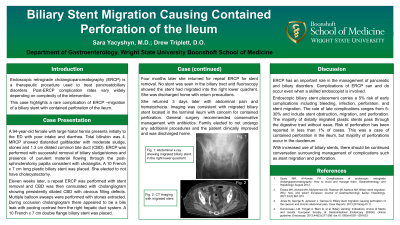Tuesday Poster Session
Category: Biliary/Pancreas
P2967 - Biliary Stent Migration Causing Contained Perforation of the Ileum
Tuesday, October 24, 2023
10:30 AM - 4:00 PM PT
Location: Exhibit Hall

Has Audio

Sara Yacyshyn, MD
Wright State University Boonshoft School of Medicine
Dayton, OH
Presenting Author(s)
Sara Yacyshyn, MD1, Drew Triplett, DO2
1Wright State University, Dayton, OH; 2Dayton Gastroenterology, Dayton, OH
Introduction: Endoscopic retrograde cholangiopancreatography (ERCP) is a therapeutic procedure used to treat pancreatobiliary disorders. Post-ERCP complication rates vary widely depending on complexity of the intervention.
This case highlights a rare complication of ERCP –migration of a biliary stent with contained perforation of the ileum.
Case Description/Methods: A 94-year-old female with large hiatal hernia presents initially to the ED with poor intake and diarrhea. Total bilirubin was 4. MRCP showed a distended gallbladder with stones and 1.3 cm dilated common duct. ERCP was performed with successful removal of biliary sludge/stones and presence of purulent material flowing through papilla post-enterotomy consistent with cholangitis. A 10 French x 7 cm long plastic biliary stent was placed. She elected to not have cholecystectomy.
Eleven weeks later, a repeat ERCP was performed with stent removal and CBD was then cannulated with cholangiogram showing persistent dilated CBD with obvious filling defect. Multiple balloon sweeps performed with stones extracted. During occlusion cholangiogram there appeared to be a bile leak with pooling contrast from the right hepatic duct system. A 10 French x 7 cm double phalange biliary stent was placed.
Four months later she returned for repeat ERCP for stent removal. No stent was seen in the biliary tract and fluoroscopy showed the stent had migrated into the right lower quadrant. She was discharged home with return precautions.
She returned 3 days later with abdominal pain and hematochezia. Imaging was consistent with migrated biliary stent located in the terminal ileum with concern for contained perforation. General surgery recommended conservative management with antibiotics. Family elected to not undergo any additional procedures. The patient clinically improved and was discharged.
Discussion: ERCP has an important role in the management of pancreatic and biliary disorders. Complications of ERCP can and do occur even when a skilled endoscopist is involved.
Endoscopic biliary stent placement carries a 5% risk of early complications including bleeding, infection, perforation, and stent migration. The rate of late complications ranges from 5-30% and include stent obstruction, migration, and perforation. The majority of distally migrated plastic stents pass through the digestive tract without issue. Risk of perforation has been reported in less than 1% of cases. This was a case of contained perforation in the ileum, but majority of perforations occur in the duodenum.

Disclosures:
Sara Yacyshyn, MD1, Drew Triplett, DO2. P2967 - Biliary Stent Migration Causing Contained Perforation of the Ileum, ACG 2023 Annual Scientific Meeting Abstracts. Vancouver, BC, Canada: American College of Gastroenterology.
1Wright State University, Dayton, OH; 2Dayton Gastroenterology, Dayton, OH
Introduction: Endoscopic retrograde cholangiopancreatography (ERCP) is a therapeutic procedure used to treat pancreatobiliary disorders. Post-ERCP complication rates vary widely depending on complexity of the intervention.
This case highlights a rare complication of ERCP –migration of a biliary stent with contained perforation of the ileum.
Case Description/Methods: A 94-year-old female with large hiatal hernia presents initially to the ED with poor intake and diarrhea. Total bilirubin was 4. MRCP showed a distended gallbladder with stones and 1.3 cm dilated common duct. ERCP was performed with successful removal of biliary sludge/stones and presence of purulent material flowing through papilla post-enterotomy consistent with cholangitis. A 10 French x 7 cm long plastic biliary stent was placed. She elected to not have cholecystectomy.
Eleven weeks later, a repeat ERCP was performed with stent removal and CBD was then cannulated with cholangiogram showing persistent dilated CBD with obvious filling defect. Multiple balloon sweeps performed with stones extracted. During occlusion cholangiogram there appeared to be a bile leak with pooling contrast from the right hepatic duct system. A 10 French x 7 cm double phalange biliary stent was placed.
Four months later she returned for repeat ERCP for stent removal. No stent was seen in the biliary tract and fluoroscopy showed the stent had migrated into the right lower quadrant. She was discharged home with return precautions.
She returned 3 days later with abdominal pain and hematochezia. Imaging was consistent with migrated biliary stent located in the terminal ileum with concern for contained perforation. General surgery recommended conservative management with antibiotics. Family elected to not undergo any additional procedures. The patient clinically improved and was discharged.
Discussion: ERCP has an important role in the management of pancreatic and biliary disorders. Complications of ERCP can and do occur even when a skilled endoscopist is involved.
Endoscopic biliary stent placement carries a 5% risk of early complications including bleeding, infection, perforation, and stent migration. The rate of late complications ranges from 5-30% and include stent obstruction, migration, and perforation. The majority of distally migrated plastic stents pass through the digestive tract without issue. Risk of perforation has been reported in less than 1% of cases. This was a case of contained perforation in the ileum, but majority of perforations occur in the duodenum.

Figure: CT imaging showing migrated biliary stent.
Disclosures:
Sara Yacyshyn indicated no relevant financial relationships.
Drew Triplett indicated no relevant financial relationships.
Sara Yacyshyn, MD1, Drew Triplett, DO2. P2967 - Biliary Stent Migration Causing Contained Perforation of the Ileum, ACG 2023 Annual Scientific Meeting Abstracts. Vancouver, BC, Canada: American College of Gastroenterology.
